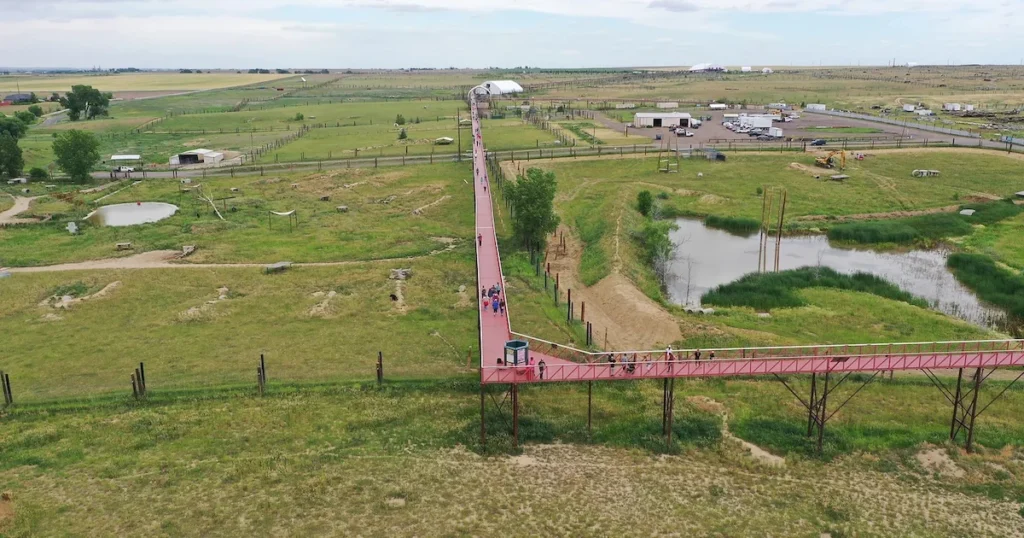PRESS RELEASE


- For Immediate Release:
- Contact:
- Samantha Miller
- 970-531-6720
- Email Samantha here
- Contact:
- Julie Marshall
- 720-255 9831
- Email Julie here
Cats Aren’t Trophies & The Wild Animal Sanctuary Held Joint Press Conference Today
Keenesburg, Colorado — Leaders of Cats Aren’t Trophies and The Wild Animal Sanctuary today offered an in-depth rationale for the ballot measure to end the cruel trophy hunting of mountain lions for their heads and trapping of bobcats for their beautiful fur at an event held at the world-renowned sanctuary in Keenesburg.
Here is a link to the Media Kit, to assist with your reporting:
Media Kit | Cats Aren’t Trophies (catsarenttrophies.org)
This media kit includes:
- Link to video, “This is NOT conservation” from the conference
- Bios of nine speakers and excerpts, with link to full text of speeches
- Link to “A Scientific Review of Mountain Lion Hunting and its Effects” by Jim Keen, DVM PhD

Samantha Miller was emcee as a rural Coloradan who serves as the Campaign Manager for Cats Aren’t Trophies (CATs). With a Master of Public Policy focusing on environmental issues, Samantha has dedicated her career to enhancing protections for native carnivores and curbing unethical hunting and trapping practices. She is a member of Rocky Mountain National Park Search and Rescue and Backcountry Horsemen of Colorado.
“Today we provide an in-depth view of why we can, and we must end the inhumane, cruel killing of mountain lions for their heads, and fur trapping of bobcats for their beautiful coats,” Miller said. “Our speakers represented the broad swath of Colorado stakeholders, including hunters, wildlife biologists, Indigenous people, veterinarians, and wildlife conservationists who are key players associated with some of the 100 organizations backing the anti-trophy-hunting ballot measure.”
The speaker lineup today included nine experts, multiple PhDs in wildlife sciences, as well as experts whose experience crosses over to include diverse life experience that includes hunting, ranching, and the expressed wisdom of Indigenous peoples, all who collectively are telling Colorado to vote “YES” on this measure.
The speaker lineup began with Pat Craig, founder of The Wild Animal Sanctuary totaling over 33,000 acres of safe haven for large carnivores, including mountain lions rescued from abusive or illegal conditions around the world.

Trophy hunting and fur trapping our cats in Colorado is no different and in fact worse than the horrific cruelty he’s witnessed over four decades, Craig explained in his speech to Colorado media, and a room filled with citizens supporting CATs.
“Trophy hunters, who are often wealthy outsiders, come to Colorado in order to hire guides and unleash packs of dogs to chase and harass these innocent animals to their demise,” he explained. “Let’s be clear: mountain lions and bobcats are not a food source as many callous individuals like to suggest. Instead, they are hunted solely for their heads and beautiful coats.”
J Dallas Gudgell, a member of the Fort Peck Assiniboine and Sioux Tribes, offered an Indigenous person’s point of view.
“As an Indigenous person concerned with and raised in a framework of right relationship with the natural world, I find trophy hunting to be an egocentric activity that upends nature’s natural balance. I support the people’s right to participate in the democratic process to protect wild cats from senseless use,” explained Gudgell, who works as Wildlife and Tribal Policy Director for the International Wildlife Coexistence Network, which is also among the 100 wildlife conservation organizations endorsing CATs. Gudgell is an experienced environmental scientist originally from the Fort Peck Reservation.
“As 2-leggeds we must recognize that we are a part of the natural world too and not separate from it. It is our responsibility as humans to recognize, honor and maintain our balance in the natural world and to coexist with our non-human relatives. And allow them to play their natural role in this balance.”
Erik Molvar, an avid elk, deer, pronghorn, caribou hunter, supports the CATs measure, because as he says, mountain lion and bobcat hunting using dogs and traps is cheating and doesn’t deserve respect from hunters or the general public.
“Hunting for big cats is trophy hunting, pure and simple. It’s to bring home a trophy…That doesn’t respect the quarry, which is one of the fundamental principles of hunting ethics, so it doesn’t deserve any particular respect by the general public, either. It’s time to end practices like cat hunting and trapping, which are an embarrassment to legitimate hunters,”said Molvar, who also is a wildlife biologist who has published science on wildlife conservation planning and population ecology and was managing editor for the official interagency commemorative book for the 50th Anniversary of the Wilderness Act.
“Running mountain lions for miles with multiple dogs until they retreat into a tree, and then shooting them, that’s not fair chase,” Molvar said. “The prey animal doesn’t have a fair chance to escape, and hunters aren’t taking the quarry using their own skill and knowledge. Catching lynx or bobcats in traps isn’t sporting either, because baiting an animal into a hidden trap using scents or meat as bait is unfair and underhanded. We don’t allow the baiting of elk and deer with salt blocks, because it’s cheating. We shouldn’t allow cats to be baited for the same reasons.”
Dr. Valerie Johnson, DVM, PhD, is a critical care veterinarian with a PhD from Colorado State University who has a long history of working at The Wild Animal Sanctuary as well as in Africa.
Mountain lion trophy hunters of Colorado “are in the same vein as the people who pay money to slay elephants or lions in Africa for their tusks or manes,” she explained. “Trophy hunters who shoot adult female lions often produce orphaned kittens who die of starvation and dehydration. That is not anything but inhumane.”
Rep. Tammy Story, serves as a member of the Colorado House of Representatives, representing District 25. She serves on the House Education Committee and Agriculture, Water & Natural Resources Committee.
“I have seen mountain lions and bobcats in the wild, on my property, multiple times over nearly 40 years in Colorado. Throughout my adult life, I have continually voiced my opposition to the trophy hunting of wildlife, including Mountain Lions and Bobcats. The cruel killing of these animals for their fur coats and heads is just plain wrong. Currently, this isn’t illegal in Colorado and this ballot initiative is the next vitally important step towards needed change,” Story said.
“By passing this ballot initiative we can finally put an end to these cruel, unnecessary killings. Join me in supporting this initiative, and I can’t wait to see this pass in November!”
Mickey Pardo, PhD, is a Colorado conservation biologist and ecologist.
“As a biologist who has been studying wildlife for over 15 years, I support the CATs ballot measure to ban trophy hunting and trapping of wild cats in Colorado. The scientific evidence is clear that hunting these animals is completely unnecessary and the methods used to hunt them are exceptionally cruel,” explained Pardo, who conducts research on wildlife ecology. Dr. Pardo’s scientific work has been widely featured in the New York Times, NPR, National Geographic, Scientific American, and the BBC.
“Bobcats are typically caught in traps, where they suffer for hours or even days before being shot, bludgeoned, or strangled to death by the trapper. Bobcat trapping in Colorado is very loosely regulated and is done primarily for commercial purposes, with trappers selling bobcat furs to luxury fashion companies. This flies in the face of the North American Model of wildlife management.”
Dr. Christine Capaldo, DVM, is a veterinarian in southwestern Colorado with experience working with big cats and training at various sanctuaries regarding carnivore behavior and medical care. She has a special interest in feline medicine.
“Allowing unlimited numbers of bobcats to be killed every year in Colorado isn’t about any type of wildlife biology management, it’s about greed, trophies, the despicable fur trade to China, and a complete disregard for the welfare of wildlife,” Dr. Capaldo said.
“Colorado’s native wild cats are not for sale and we will not tolerate this cruelty. Let’s get out of the 1800s and join the other states and nations that don’t allow bobcat or mountain lion hunting. In November, join me and my community in voting YES to protect Colorado cats.”
Deanna Meyer, is a Coloradan who raises goats and chickens on her family land abutting public forest lands, and in lion country.
“One Christmas Day two years ago, I followed the sounds, finding six dogs who treed a terrified bobcat on my land. I was infuriated when I found out that there was nothing I could do. If this initiative passes, it will end this harassment and protect lions and bobcats who aren’t causing conflicts with humans,” explains Meyer, whose family land encompasses an elk calving ground that they have placed in a conservation easement. Protecting wildlife and land is her passion and she knows that cats aren’t trophies.
“Passing this initiative will give CPW the legal tools to focus on protecting, not killing, these species.”
Delia Malone is Wildlife Chair, Colorado Sierra Club, which is the state chapter of one of the true leading wildlife conservation groups of Colorado and one of 100 organizations officially endorsing CATs. Malone is a working field ecologist and also a member of the Sierra Club’s Roaring Fork Group’s Executive Committee and vice-chair of Roaring Fork Audubon, which is one of six Audubon Societies also endorsing CATs.
“I’m an ecologist on Colorado’s West Slope where I’ve worked conducting ecological and biological surveys for several decades.… Over all these years I’ve been lucky enough to catch a fleeting glimpse of a cougar only half-a-dozen times or so … although I know, from finding their fresh tracks, scat and kills, that they’ve watched me many, many times. At my home in Redstone which borders roadless area, we’re lucky enough to have a cougar family that has lived in the forest above us for generations — although we occasionally catch a glimpse of mom and cubs — we’ve never had a negative encounter with the cougar family,” Malone explains.
“Not only is the trophy killing of mountain lions ecologically unsustainable, contributing to the downward spiral of the health of our wildlands and the loss of biological diversity, but because trophy killing contradicts the science, it is ethically wrong and should be outlawed.”
CATs is a political committee in Colorado that has successfully filed 2024 ballot language to ban trophy hunting of mountain lions and fur trapping of bobcats. The measure also protects lynx, who are sometimes mistaken for bobcats and killed.
CATs believes that trophy hunting of mountain lions and bobcats is cruel and unsporting — a highly commercial, high-tech head-hunting exercise that doesn’t produce edible meat or sound wildlife management outcomes, but only orphaned cubs and social chaos among the surviving big cats.

